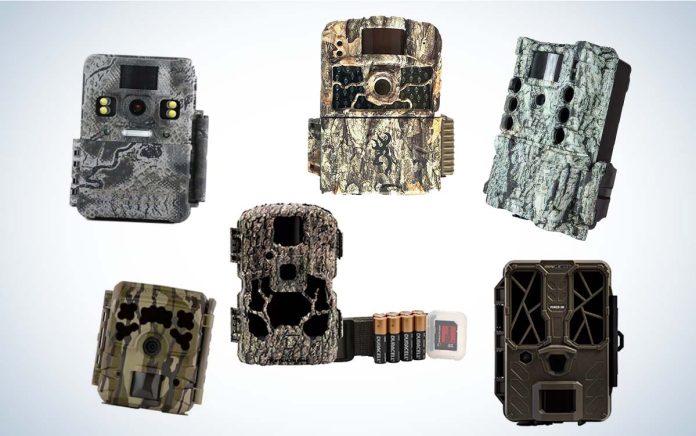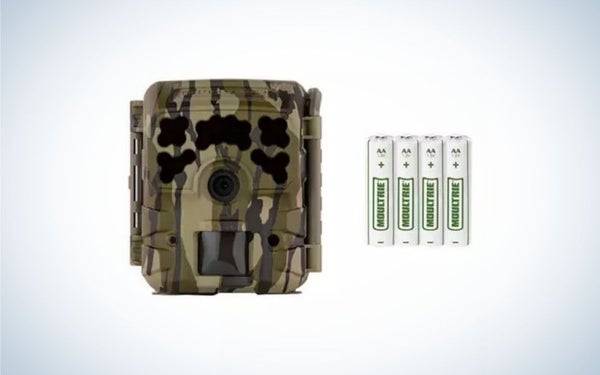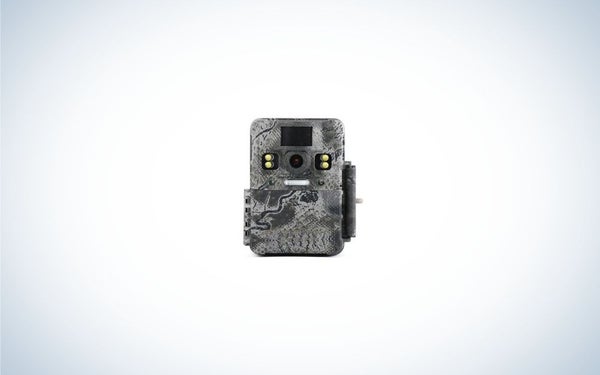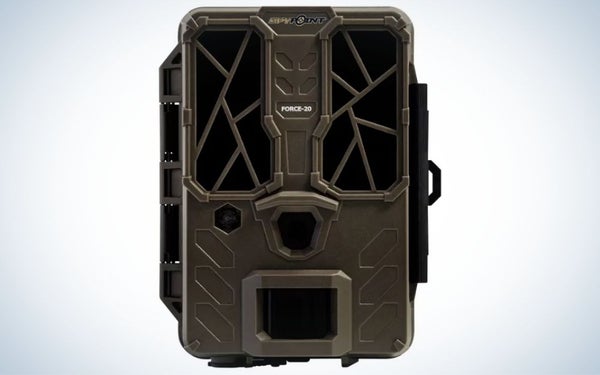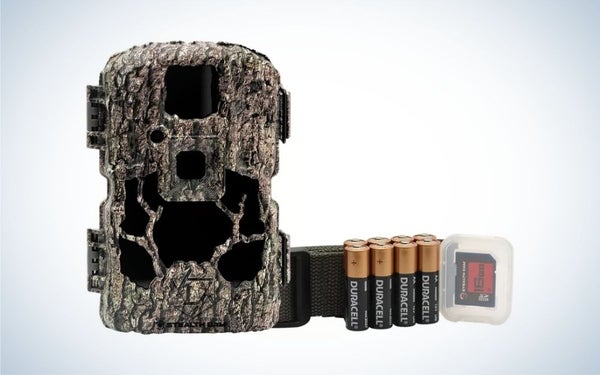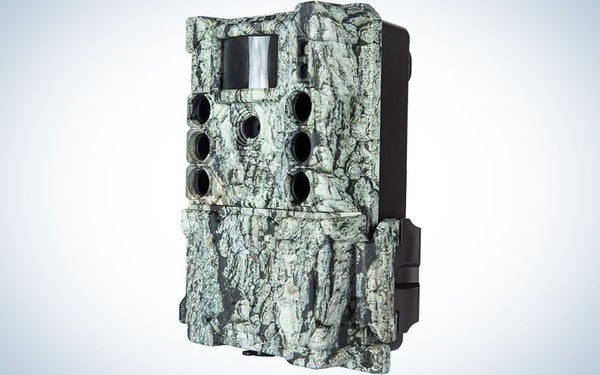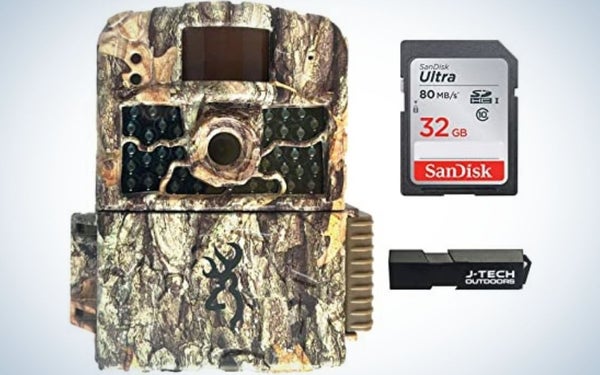We may earn revenue from the products available on this page and participate in affiliate programs. Learn more ›
Written By
Scott Bestul
Updated Aug 2, 2023 12:07 PM
Budget trail cameras don’t mean they are bad trail cameras. Successfully using trail cams is, in my mind, a numbers game. The more cameras you have out there scouting for you, the better chance you have of capturing a picture of that trophy buck. That means searching for a camera that combines a budget-minded price tag with consistent performance.
Sound like an impossible dream? Sure, maybe a decade ago. But like anything involving technology, the longer companies tinker with cameras, the better they get at maximizing performance. Even better, more companies have entered the trail cam market, and competition almost always results in lower prices for consumers. In other words, we’re living in the golden age of trail cameras, with quality models less expensive than ever before. If you decide you want to upgrade, check out some of our top picks for the best cellular trail cameras.
What do you shop for when looking for a budget trail camera? The same qualities you would look for in a more expensive model, but with realistic expectations. Sure, you may not get the tack-sharp pics or lightning-fast trigger speeds of a Cadillac camera, but you can still buy a perfectly serviceable camera at a price that will still let you take your family out for dinner once in a while (or, of course, have leftover money for other hunting gear). Here are some features to look for in the best budget trail cameras and what we evaluated when we picked the models below.
How We Picked The Best Budget Trail Cameras
In addition to using trail cams on a year-round basis for scouting game, I’ve tested them for Field & Stream for several years. I’ve used cameras from most of the major manufacturers and hunt with several buddies who are also avid trail cam users; their input and feedback help me make good choices and informed opinions when selecting cameras.
Best Budget Trail Cameras: Reviews & Recommendations
Specs
- Trigger speed: .4 seconds
- Detection range: 70 feet
- Flash range: 80 feet
- Flash type: No-glow
- Camera: 42 MP
Pros
- Compact size
- Solid trigger speed
- Good detection ranges
Cons
- No-glow flash might affect night picture quality at longer ranges.
Perhaps the coolest thing about the 42i is its compatibility with Moultrie’s new “Moultrie Mobile” system (provided you add a modem), which links cameras together to send pics to your phone or tablet; in essence, you’re getting another wireless cam without paying the price. The trigger speed is very good for a budget camera, and with a compact size (3-1/4” X 3-1/2” X 2-½”), this unit can be strapped to smaller trees and still be nearly invisible to wildlife. With no-glow flash and its small size, it would be a good choice for a security camera. Moultrie also offers a two-year warranty.
Best Long Detection: Spartan Lumen
Specs
- Trigger Speed: NA
- Detection range: 60 feet
- Flash range: 80-plus feet
- Flash type: Xenon (white) flash
- Camera: 24 MP (adjustable)
Pros
- Adjustable resolution is a great feature
- Color night pics
- Excellent flash range
Cons
- White flash could spook game in some setups
With the advent and popularity of low- and no-glow cameras, it’s becoming tougher to find a white flash model, and the Lumen will please fans of this feature. While the Lumen is fairly tall (8”), it features a slim profile and is easy to hide. Adjustable resolution (3MP, 8 MP, or 24 MP) is a nice touch, and–hint for trail cam newbies–the best pics typically come at the lower ends of the spectrum. The 80’ flash range competes with the best of the budget cams, and Spartan’s two-year warranty is an excellent extra for this moderately priced camera.
Specs
- Trigger speed: .7 seconds
- Detection range: 70 feet
- Flash range: 80 feet
- Flash type: Infrared
- Camera: 20 MP
Pros
- Solid trigger speed
- Lightweight and easy to mount
- Excellent warranty
Cons
For a camera you can buy for C-note, the trigger speed on the Force-20 is very good, and the viewing window (used to set up the camera and view images in the field) is 1-½” for easy viewing. Three modes (pics, video, and time-lapse) add to the versatility of this camera, and 48 LEDs result in solid nighttime images for an IR camera. Spypoint cameras are also lightweight, easy to mount, and come with the company’s “know you’re covered warranty,” which is one of the best in the business.
Specs
- Trigger speed: 0.4 seconds
- Detection range: 80 feet
- Flash range: NA
- Flash type: IR
- Camera: 4, 8,16-26 MP (adjustable)
Pros
- Good trigger speed
- Adjustable resolution
- Option for solar power
Cons
- IR flash will result in blurrier night pics
Stealthcam has been in the business long enough to know how to make a good camera at an attractive price. The Prevue 26 checks both boxes. I like the option to adjust the resolution (experience has taught me that lower is generally better, but it’s best to experiment and see what your camera likes best), and there’s a generous- and color-viewing screen in the back for in-field picture review. Finally, there’s the option of adding Stealth’s SOLPAK (not included), which runs the camera on solar power. While not cheap ($69.99), this option can save users a bunch of battery money in the long run (full disclosure; I typically spend around $300 on batteries per year).
Specs
- Trigger speed: 0.2 seconds
- Detection range: 75 feet
- Flash range: 110 feet
- Flash type: No-glow
- Camera: 30 MP
Pros
- Blazing trigger speed
- Good detection range
- Excellent flash range
Cons
- Higher price tag for a budget model
I’ve not found a quicker trigger for the price, and the 4K video on the S-4K is tack sharp. Even better, the detection range for a no-glow model is almost unheard of. There are three preset modes for easy setup, but if you’re a camera geek (like me), you might want to mess with the advanced modes. Bushnell also offers a two-year limited warranty.
Specs
- Trigger speed: 0.3-0.7 second (adjustable)
- Detection range: 80 feet
- Flash range: 100 feet
- Flash type: Infrared
- Camera: 18 MP
Pros
- Very good trigger speed
- Nice video
- Small profile3
Cons
- Upper end of the “budget” price point
Browning has been doing trail cams right for many years, and they carry that quality from their high-end models right down to more affordable ones. Their Strike Force series is particularly impressive; the adjustable trigger (which on the low end is super-fast for a budget cam) allows adjustment for areas where speed isn’t so critical (mineral licks or mock scrapes), which can save on battery life. Exceptional video on this model for the price and a very impressive detection range for a no-glow camera. The Strike Force HD Max also sports a very small profile (4-¼” X 3”) for such a big-performing camera.
Things to Consider When Buying The Best Budget Trail Cameras
The most important consideration when buying a camera is your budget. We all want high quality and top performance, but often that means spending more money than we have. We’ve tried to pick cams that represent a range of prices in the “budget” category, so choose the one your wallet can handle. Second, don’t be afraid to check out word-of-mouth experiences from folks who’ve tried the model you’re considering, especially when it comes to customer service. Experienced cam-users can save you a lot of head-scratching when it comes down to choosing the best model for you. Here are some other factors to consider.
Trigger Speed
The trigger speed of a trail camera is the elapsed time between a camera’s sensor detecting game and when it actually snaps a picture. Generally, the faster the speed, the better, especially when your camera setup is likely to capture a moving animal.
Detection Range
The camera’s detection range is the furthest distance at which a camera can detect an animal and trigger a picture in daylight conditions. As a rule of thumb, the greater the distance, the better, as the camera will simply detect more game.
Flash Range
Like detection distance, the flash range of a camera is the maximum distance at which the flash can illuminate the subject for a clean shot. This range can be affected by the type of flash the camera employs (see below).
Flash Type
Standard white flash is the only kind that shoots color at night and typically results in the sharpest pictures. But white flash is also the brightest and may spook game. Red-glow flash is less detectable by wildlife, but the pics are black and white. No-glow is nearly invisible to wildlife (and people, if you also use the camera for security purposes), but flash range and picture quality often take a hit. Deciding which is best depends on your intended use of the camera.
Megapixel (MP) Rating
It’s common for manufacturers to tout their high-megapixel cameras and for buyers to be wowed, as in “an 18MP camera is over four times better than a 4MP model.” Companies can tweak their camera’s resolution by an interpolation process, where the camera’s original megapixels are enhanced or multiplied by the camera’s software. Without getting uber-technical, this process impacts the clarity of the photos. Since manufacturers tout the megapixel rating, we’ll do it too. But fair warning; do some snooping to see examples of photos taken with the camera to get a true idea of image quality.
FAQs
Q: Can you use a trail cam as a security cam?
You can absolutely use a trail cam to guard your home, business, or property. Any good camera will capture pics of a trespasser or thief as easily as it does wild game. However, it’s wise to use a no-glow, or infrared model, as any flash projection would likely be detected by a trespasser, who will do his best to steal or disable your camera. It’s also a good idea to mount the camera discreetly to lessen the chances of its detection; I like to mount them above a person’s line of sight, pointed down at a likely point of entry, such as a door or gate. If that’s not possible, do your best to camouflage the camera instead of mounting it in a highly visible spot where the bad guys can see it.
Q: Will a trail camera pick up a mouse?
Cameras take pics whenever the sensor detects heat or motion, so yes, any moving object will trigger the camera. In fact, one of my favorite tests of a camera’s trigger speed is to mount it by one of my bird feeders. Since birds are in constant motion, the camera’s ability to take quality pics of these tiny, ever-moving “targets” says a lot about its quality. And while most of us set cameras out in hopes of getting photos of a big buck, I enjoy looking at all the non-game critters out there too. Some of my favorite pics from last season included two different bobcats, a fisher, a grey fox, and an owl.
Q: What cameras have the best battery life?
With a few exceptions, most modern cameras have pretty decent battery life. But you can do a whole lot to keep your cameras running for months. First, use lithium batteries instead of the traditional alkaline. Yes, lithiums are more expensive, but they’re worth the few extra bucks you’ll spend upfront and result in extended performance. Rechargeable batteries are another option but require a more substantial initial investment; if you’re on a tight budget, lithiums are the way to go.
Second, keep the battery chamber free of dust and dirt and use an emery cloth to keep battery contact points clean and free of oxidization. I like to stick a dryer sheet in the battery compartment to ensure ants don’t crawl in and short out the system (yes, this has happened to me more than once).
If your camera is in a remote location that you can’t often access, keep it in “picture” instead of “video” mode. Videos are cool and uber fun to watch, but they are super hard on battery life. I can get months of performance from a cam in picture mode; that same unit set on video will be lucky to last a couple of weeks.
Best Budget Trail Cameras: Final Thoughts
It’s important to remember that, at the end of the day, trail cams are electronic devices, like your computer or cellphone. This means you’re going to have problems or glitches from time to time, and this is true of even the companies that put quality first. So in my mind, customer service is critical. Check out the company’s warranty before purchasing so you’ll know what to expect if your camera fails or you’re having problems. Stick to this guide above and you’ll be sure to find the best budget trail camera for you.
Why Trust Us
For more than 125 years, Field & Stream has been providing readers with honest and authentic coverage of outdoor gear. Our writers and editors eat, sleep, and breathe the outdoors, and that passion comes through in our product reviews. You can count on F&S to keep you up to date on the best new gear. And when we write about a product—whether it’s a bass lure or a backpack—we cover the good and the bad, so you know exactly what to expect before you decide to make a purchase.

